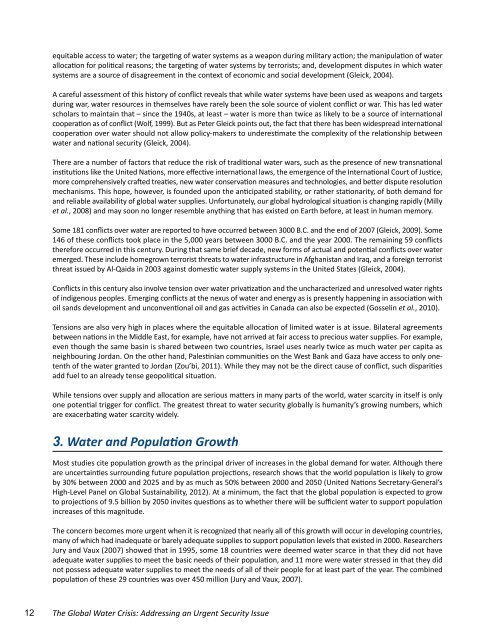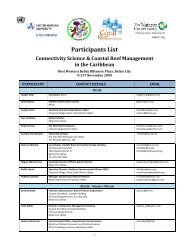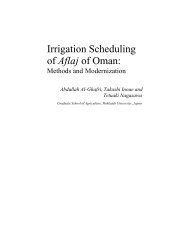The Global Water Crisis: Addressing an Urgent Security - Unu-inweh ...
The Global Water Crisis: Addressing an Urgent Security - Unu-inweh ...
The Global Water Crisis: Addressing an Urgent Security - Unu-inweh ...
Create successful ePaper yourself
Turn your PDF publications into a flip-book with our unique Google optimized e-Paper software.
equitable access to water; the targeting of water systems as a weapon during military action; the m<strong>an</strong>ipulation of water<br />
allocation for political reasons; the targeting of water systems by terrorists; <strong>an</strong>d, development disputes in which water<br />
systems are a source of disagreement in the context of economic <strong>an</strong>d social development (Gleick, 2004).<br />
A careful assessment of this history of conflict reveals that while water systems have been used as weapons <strong>an</strong>d targets<br />
during war, water resources in themselves have rarely been the sole source of violent conflict or war. This has led water<br />
scholars to maintain that – since the 1940s, at least – water is more th<strong>an</strong> twice as likely to be a source of international<br />
cooperation as of conflict (Wolf, 1999). But as Peter Gleick points out, the fact that there has been widespread international<br />
cooperation over water should not allow policy-makers to underestimate the complexity of the relationship between<br />
water <strong>an</strong>d national security (Gleick, 2004).<br />
<strong>The</strong>re are a number of factors that reduce the risk of traditional water wars, such as the presence of new tr<strong>an</strong>snational<br />
institutions like the United Nations, more effective international laws, the emergence of the International Court of Justice,<br />
more comprehensively crafted treaties, new water conservation measures <strong>an</strong>d technologies, <strong>an</strong>d better dispute resolution<br />
mech<strong>an</strong>isms. This hope, however, is founded upon the <strong>an</strong>ticipated stability, or rather stationarity, of both dem<strong>an</strong>d for<br />
<strong>an</strong>d reliable availability of global water supplies. Unfortunately, our global hydrological situation is ch<strong>an</strong>ging rapidly (Milly<br />
et al., 2008) <strong>an</strong>d may soon no longer resemble <strong>an</strong>ything that has existed on Earth before, at least in hum<strong>an</strong> memory.<br />
Some 181 conflicts over water are reported to have occurred between 3000 B.C. <strong>an</strong>d the end of 2007 (Gleick, 2009). Some<br />
146 of these conflicts took place in the 5,000 years between 3000 B.C. <strong>an</strong>d the year 2000. <strong>The</strong> remaining 59 conflicts<br />
therefore occurred in this century. During that same brief decade, new forms of actual <strong>an</strong>d potential conflicts over water<br />
emerged. <strong>The</strong>se include homegrown terrorist threats to water infrastructure in Afgh<strong>an</strong>ist<strong>an</strong> <strong>an</strong>d Iraq, <strong>an</strong>d a foreign terrorist<br />
threat issued by Al-Qaida in 2003 against domestic water supply systems in the United States (Gleick, 2004).<br />
Conflicts in this century also involve tension over water privatization <strong>an</strong>d the uncharacterized <strong>an</strong>d unresolved water rights<br />
of indigenous peoples. Emerging conflicts at the nexus of water <strong>an</strong>d energy as is presently happening in association with<br />
oil s<strong>an</strong>ds development <strong>an</strong>d unconventional oil <strong>an</strong>d gas activities in C<strong>an</strong>ada c<strong>an</strong> also be expected (Gosselin et al., 2010).<br />
Tensions are also very high in places where the equitable allocation of limited water is at issue. Bilateral agreements<br />
between nations in the Middle East, for example, have not arrived at fair access to precious water supplies. For example,<br />
even though the same basin is shared between two countries, Israel uses nearly twice as much water per capita as<br />
neighbouring Jord<strong>an</strong>. On the other h<strong>an</strong>d, Palestini<strong>an</strong> communities on the West B<strong>an</strong>k <strong>an</strong>d Gaza have access to only onetenth<br />
of the water gr<strong>an</strong>ted to Jord<strong>an</strong> (Zou’bi, 2011). While they may not be the direct cause of conflict, such disparities<br />
add fuel to <strong>an</strong> already tense geopolitical situation.<br />
While tensions over supply <strong>an</strong>d allocation are serious matters in m<strong>an</strong>y parts of the world, water scarcity in itself is only<br />
one potential trigger for conflict. <strong>The</strong> greatest threat to water security globally is hum<strong>an</strong>ity’s growing numbers, which<br />
are exacerbating water scarcity widely.<br />
3. <strong>Water</strong> <strong>an</strong>d Population Growth<br />
Most studies cite population growth as the principal driver of increases in the global dem<strong>an</strong>d for water. Although there<br />
are uncertainties surrounding future population projections, research shows that the world population is likely to grow<br />
by 30% between 2000 <strong>an</strong>d 2025 <strong>an</strong>d by as much as 50% between 2000 <strong>an</strong>d 2050 (United Nations Secretary-General’s<br />
High-Level P<strong>an</strong>el on <strong>Global</strong> Sustainability, 2012). At a minimum, the fact that the global population is expected to grow<br />
to projections of 9.5 billion by 2050 invites questions as to whether there will be sufficient water to support population<br />
increases of this magnitude.<br />
<strong>The</strong> concern becomes more urgent when it is recognized that nearly all of this growth will occur in developing countries,<br />
m<strong>an</strong>y of which had inadequate or barely adequate supplies to support population levels that existed in 2000. Researchers<br />
Jury <strong>an</strong>d Vaux (2007) showed that in 1995, some 18 countries were deemed water scarce in that they did not have<br />
adequate water supplies to meet the basic needs of their population, <strong>an</strong>d 11 more were water stressed in that they did<br />
not possess adequate water supplies to meet the needs of all of their people for at least part of the year. <strong>The</strong> combined<br />
population of these 29 countries was over 450 million (Jury <strong>an</strong>d Vaux, 2007).<br />
12 <strong>The</strong> <strong>Global</strong> <strong>Water</strong> <strong>Crisis</strong>: <strong>Addressing</strong> <strong>an</strong> <strong>Urgent</strong> <strong>Security</strong> Issue




